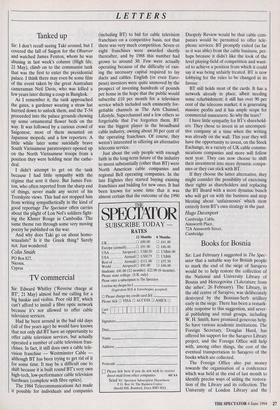TV commercial
Sir: Edward Whitley (`Reverse charge at Br, 21 May) almost had me calling for a big hankie and violins. Poor old BT, which can't afford to install a fibre optic network because it's not allowed to offer cable television services.
Had he been around in the bad old days (all of five years ago) he would have known that not only did BT have an opportunity to offer cable television services, but actually operated a number of cable television fran- chises. In fact, it still does own a cable tele- vision franchise — Westminster Cable although BT has been trying to get rid of it for some time. It may be a difficult one to shift because it is built round BT's very own high-tech, low-performance cable television hardware (complete with fibre optics). The 1984 Telecommunications Act made it possible for individuals and companies (including BT) to bid for cable television franchises on a competitive basis, not that there was very much competition. Seven or eight franchises were awarded shortly thereafter, and by 1988 this number had grown to around 30. Few were actually operating because of the difficulty of rais- ing the necessary capital required to lay ducts and cables. English (or even Euro- pean) investors were quite unmoved by the prospect of investing hundreds of pounds per home in the hope that the public would subscribe £10 per month for a television service which included such eminently for- gettable channels as The Arts Channel, Lifestyle, Superchannel and a few others so forgettable that I've forgotten them. BT was the biggest player in the broadband cable industry, owning about 30 per cent of the operating franchises. Of course, they weren't interested in offering an alternative telecoms service.
Just about the only people with enough faith in the long-term future of the industry to invest substantially (other than BT) were North American cable companies and regional Bell operating companies. In the late Eighties they started buying existing franchises and bidding for new ones. It had been known for some time that it was almost certain that the outcome of the 1990 Duopoly Review would be that cable com- panies would be permitted to offer tele- phone services. BT promptly exited (as far as it was able) from the cable business, per- haps because it didn't like the look of the level playing-field of competition and want- ed to achieve a position from which it could say it was being unfairly treated. BT is now lobbying for the rules to be changed in its favour.
BT still holds most of the cards. It has a network already in place, albeit needing some refurbishment; it still has over 90 per cent of the telecoms market; it is generating massive profits and it has ample scope for commercial manoeuvre. So why the tears?
I have little sympathy for BT's sharehold- ers. They chose to invest in an uncompeti- tive company at a time when the writing was already on the wall. This year they will have the opportunity to invest, on the Stock Exchange, in a variety of UK cable commu- nications companies and more will follow next year. They can now choose to shift their investment into more dynamic compa- nies or they can stick with BT.
If they choose the latter alternative, they might consider the possibility of exercising their rights as shareholders and replacing the BT Board with a more dynamic bunch who will get on with the business and stop bleating about `unfairnesses' which stem entirely form BT's own strategy in the past.
Hugo Davenport
Cambridge Cable, Ainsworth Place., 72A Ainsworth Street, Cambridge


























































 Previous page
Previous page